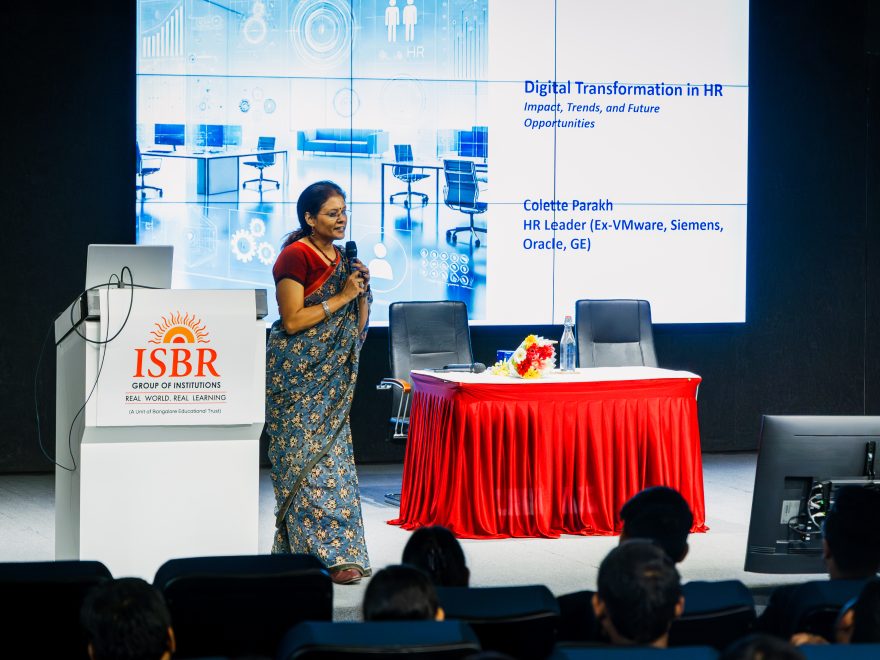ISBR Business School welcomed Ms. Colette Parakh, an HR leader and Associate Certified Coach, who led an insightful guest lecture on digital transformation in HR. She debunked myths, revealed new insights, and provided a practical guide to navigating HR’s digital evolution.
1. Game-Changing Benefits of Going Digital in HR
A) Boosting Employee Satisfaction with Ease
With the right digital HR tools, employee satisfaction can surge. Deloitte’s global report shows a 12% increase in employee satisfaction in companies implementing digital HR solutions. This reflects how digitalization fosters higher engagement, morale, and loyalty.
B) Slashing Costs with Smart Automation
The Hackett Group found that automating payroll processes can cut costs by as much as 40%. This efficiency allows HR to streamline operations and reallocate resources toward strategic initiatives.
C) Crystal Clear Transparency & Strategic Insights
Digital HR systems offer better data visibility, enhancing HR’s role in strategic workforce planning. With improved transparency, organizations can make informed decisions that support growth and employee development.
2. Overcoming the Challenges: Breaking Down Barriers to Digital HR
A) Tackling Resistance to Change
Change is not always easy. For example, a multinational company’s HR team experienced resistance while rolling out a new HRIS, highlighting the need for careful change management. Proper planning and support can make all the difference.
B) Putting Data Privacy First
With digital transformation, data privacy is paramount. Protecting sensitive employee information is essential not only to comply with regulations but also to maintain trust within the organization.
C) Integrating Systems Seamlessly
Integration can be complex. A technology firm found that linking payroll systems to a new HR platform was challenging, but ultimately it reduced errors and saved time, proving the payoff of overcoming initial hurdles.
D) Addressing Skill Gaps in the New Digital Landscape
A digital HR environment demands new skills. Upskilling HR teams in data analytics, AI, and other tech-driven practices equips them to thrive in the digital age and maximize HR’s potential.

3. Winning Solutions for a Smooth Digital Transformation
A) Empowering Through Training
Google’s training program for AI-driven recruitment tools is an excellent example of success. By investing in training, they achieved higher adoption rates and enabled their HR team to fully leverage new tools.
B) Clear & Open Communication for Buy-In
A healthcare company effectively used regular town halls, feedback sessions, and forums to keep the dialogue open. Clear communication fosters transparency and encourages employees to embrace digital change.
C) Taking it Slow with Incremental Rollouts
When a retail chain phased in HRIS tools, the gradual approach ensured a smoother transition and higher adoption rates. This step-by-step method minimizes disruption and fosters employee acceptance.
4. Key Takeaways: What Every HR Team Needs to Know
- Digital transformation can yield tangible benefits in employee satisfaction and cost efficiency.
- Barriers can be managed with proper planning, focused on both technical and human aspects.
- Successful transformation requires clear communication, training, and an incremental approach.
- A balanced strategy prioritizing security, transparency, and skill development ensures long-term success.
5. Expert Recommendations for a Seamless HR Transformation
- Train for Success: Offer thorough training programs before and during the digital shift.
- Keep Communication Lines Open: Regularly gather feedback and maintain open channels for concerns.
- Go Phase by Phase: Use a gradual rollout for complex systems to ease the transition.
- Secure Sensitive Data: Prioritize robust data privacy and security measures.
- Invest in Upskilling: Equip HR teams with the technical skills needed for digital-driven HR.
Ms. Colette Parakh’s insightful session illuminated a clear path to digital HR transformation, blending practical solutions with strategic foresight. By embracing the benefits, addressing challenges head-on, and implementing these proven strategies, organizations can leverage digital transformation to build a more efficient, engaged, and future-ready HR landscape.
About ISBR Business School: ISBR Business School, located in Bangalore, India, is a premier institution dedicated to providing world-class education in business and management. Accredited by the NBA and recognized by the Association of Indian Universities and the Ministry of HRD, Government of India, ISBR has consistently been ranked as a platinum institute by AICTE-CII. With a diverse student body, a strong emphasis on industry collaboration, and a curriculum designed to foster innovation and leadership, ISBR Business School is committed to shaping the business leaders of tomorrow. The school’s robust placement record and partnerships with top global companies underscore its commitment to excellence and career readiness for its students

